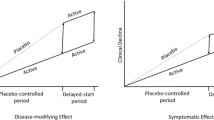Abstract
Recommendations for clinical trials methods for ‘pre-dementia,’ ‘prodromal,’ or early Alzheimer’s disease are discussed. Early AD can be considered as subsets of both ‘amnestic MCI’ and ‘probable AD.’ In principle, it can be operationalized using recently proposed, new research criteria for AD that specifically does not require impairment in non-memory cognitive function and activities of daily living, and consequently does not require the presence of dementia. The criteria also require patients to show abnormal putative biomarkers but require validation. Trials in early AD should be done when models of drug action and response suggest that the drug in development likely would be effective in early AD and clinical effects could be expected in a relatively short time. Biomarkers should be used as stratification or explanatory variables that may help to explain clinical outcomes from early AD trials rather than as inclusion/exclusion criteria in order to avoid pseudospecificity. Trials should be multicentered, double-blinded, randomized, placebo-controlled, generally with dose-ranging of two doses if indicated. Duration of trials should be based on expected onsets and durations of effects, and generally should be less than one year. Crossover trials should be considered when appropriate. Primary outcomes should specifically assess memory and include repeated assessments. Potential secondary outcomes could include self- and observer-rated health-related quality of life and global impressions of change in lieu of activities of daily living. Onset of dementia should not be an endpoint because many patients would be on the cusp of dementia and dementia onset is influenced by numerous biological and environmental factors. Inferences that can be made from trials results will likely involve the effects of the test drug on memory and self-rated global function. Disease modification is not likely to be inferred except in trials over two years in duration in which a change in a biomarker can be used as an adjunctive assessment. Models and simulations using existing clinical trials databases would be helpful in planning early AD trials.
Similar content being viewed by others
References
McKhann G, Drachman D, Folstein M, et al. Clinical diagnosis of Alzheimer’s disease: report of the MNCDS-ADRDA Work Group under the auspices of Department of Health and Human Services Task Force on Alzheimer’s Disease. Neurology 1984;34: 939–944.
Schneider LS. Issues in design and conductance of clinical trials for cognitiveenhancing drugs. In, Animal and Translational Models of Behavioural Disorders, volume 2: Neurological Disorders. Edited by RA McArthur and F Borsini. Elsevier, New York, 2008.
Jicha GA, Parisi JE, Dickson DW et al. Neuropathologic outcome of mild cognitive impairment following progression to clinical dementia. Arch Neurol 2006;63: 674–81.
Petersen RC, Thomas RG, Grundman M, Bennett D, Doody R, Ferris S, et al. Vitamin E and donepezil for the treatment of mild cognitive impairment. N Engl J Med 2005;352:2379–88.
Folstein MF, Folstein SE, Mc Hugh PR. Mini-Mental-Test: a practical method for grading the cognitive state of patient for the clinician. J Psychiatr Res 1975; 12: 189–198
Dubois B, Feldman HH, Jacova C, Dekosky ST, Barberger-Gateau P, Cummings J, et al. Research criteria for the diagnosis of Alzheimer’s disease: revising the NINCDS-ADRDA criteria. Lancet Neurol 2007;6:734–46.
Visser, PJ, Kester A, Jolles J, Verhey F. Ten-year risk of dementia in subjects with mild cognitive impairment Neurology 2006;67: 1201–1207
Schneider LS, Sano M. Current Alzheimer Disease Clinical Trials: Methods and Placebo Outcomes. Alzheimer’s & Dementia 2009;5(5): 388–397
Schneider, LS, Raman R, Schmitt FA, Doody R, Insel P, Clark CM, Morris JC, Reisberg B, Petersen RC, Ferris SH. Characteristics and performance of a modified version of the ADCS-CGIC CIBIC+ for mild cognitive impairment clinical trials. Alzheimer’s Disease and Associated Disorders, 2009;23(3): 260–267
Galasko D, Bennett DA, Sano M, Marson D, Kaye J, Edland SD, et al. ADCS prevention instrument project: assessment of instrumental activities of daily living for community-dwelling elderly individuals in dementia prevention clinical trials. Alzheimer Dis Assoc Disord 2006;20(4 Suppl. 3):S152–S169.
ADAPT Research Group. Naproxen and celecoxib do not prevent AD in early results from a randomized controlled trial. Neurology 2007;68:1800–1808.
DeKosky ST, Williamson JD, Fitzpatrick AL, et al. Ginkgo Evaluation of Memory (GEM) Study Investigators. Ginkgo biloba for prevention of dementia: a randomized controlled trial. JAMA. 2008;300(19):2253–2262.
Andrieu S, Ousset PJ, Coley N, Ouzid M, Mathiex-Fortunet H, Vellas B. GuidAge study; a 5-year double blind, randomised trial of EGb 761 for the prevention of Alzheimer’s disease in elderly subjects with memory complaints. i. rationale, design and baseline data. Current Alzheimer Research. 2008; 5(4): 406–415.
Author information
Authors and Affiliations
Corresponding author
Rights and permissions
About this article
Cite this article
Schneider, L.S. The potential and limits for clinical trials for early Alzheimer’s disease and some recommendations. J Nutr Health Aging 14, 295–298 (2010). https://doi.org/10.1007/s12603-010-0066-1
Received:
Accepted:
Published:
Issue Date:
DOI: https://doi.org/10.1007/s12603-010-0066-1




